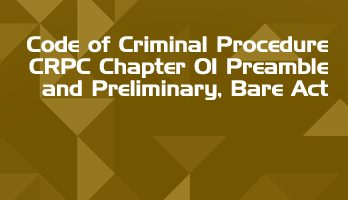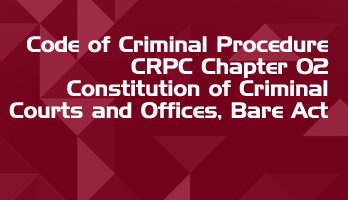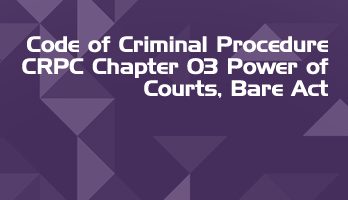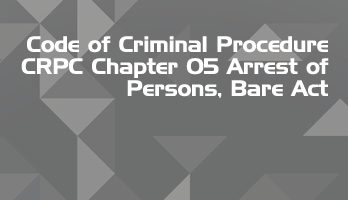A 'Bare act' is the actual legislation passed by the Parliament of India. Generally, an act sets out the high level legal and policy principles applicable to the subject matter of the law.
Most acts are accompanied by 'subsidiary legislation' such as rules, regulations, notifications and orders; which address the actual implementation detail of the act.
Free Full Course Available on LawMint's YouTube Channel
How to Land Your Dream LLB Internship in a Top Law Firm
- Part 1 - Introduction
- Part 2 - Internship Planning
- Part 3 - Internship Research
- Part 4 - Building Your Profile
- Part 5 - The Email
- Part 6 - The Resume
- Part 7 - The Cover Letter
- Part 8 - The Interview
- Part 9 - Self Development
Practical and comprehensive course, with real examples and step-by-step analysis of the complete internship application process. Check out LawMint's YouTube channel now!
Civil Procedure Code, 1908
Part X – Rules
Section 121 – Effect of rules in First Schedule
The rules in a First Schedule shall have effect as if enacted in the body of this Code until annulled or altered in accordance with the provisions of this Part.
Section 122 – Power of certain High Courts to make rules
High Courts not being the Court of a Judicial Commissioner may, from time to time after previous publication, make rules regulating their own procedure and the procedure of the Civil Courts subjects to their superintendence, and may be such rules annul, alter or add to all or any of the rules in the First Schedule.
Section 123 – Constitution of Rule Committees in certain States
- A committee to be called the Rule Committee, shall be constituted at the town which is the usual place of sitting of each of the High Courts referred to in section 122.
- Each such Committee shall consist of the following persons, namely –
- three Judges of the High Court established at the town at which such Committee is constituted, one of whom at least has served as a District Judge or a Divisional Judge for three years,
- two legal practitioners enrolled in that Court
- a Judge of a Civil Court subordinate to the High Court
- The members of each such Committee shall be appointed by the High Court, which shall also nominate one of their number to be President
- Each member of any such Committee shall hold office for such period as may be prescribed by the High Court in this behalf; and whenever any member retires, resigns, dies or ceases to reside in the State in which the Committee was constituted or becomes incapable of acting as a member of the Committee, the said High Court may appoint another person to be a member in his stead.
- There shall be a secretary to each such Committee who shall be appointed by the High Court and shall receiver such remuneration as may be provided in this behalf by the State Government.
STATE AMENDMENTS
Assam and Nagaland – Substitute the following for clause (a) sub – section (2) of section 123. “(a) three judges of the High Court established at the town at which such committee is constituted, Provided that the Chief Justice may appoint only two judges of the High Court on the Committee if the number of Judges of the High Court does not exceed three”
Tamil Nadu – In section 123 sub – section (2). (a) “In clause (b) for the words two legal practitioners substitute the words three legal practitioners.” (b) “Omit the words `Madras’ in clause (d)”.
Section 124 – Committee to report to High Court
Every Rule Committee shall make a report to the High Court established at the town at which it is constituted on any proposal to annul, alter or add to the rules in the First Schedule or to make new rules, and before making any rules under section 122 the High Court shall take such report into consideration.
Section 125 – Power of other High Courts to make rules
High Courts, other than the Courts specified in section 122, may exercise the powers conferred by that section in such manner and subject to such conditions as the State government may determine;
Provided that any such High Court may, after previous publication, make a rule extending within the local limits of its jurisdiction any rules which have been made by any other High Court.
Section 126 – Rules to be subject to approval
Rules made under the foregoing provisions shall be subject to the previous approval of the Government of the State in which the Court whose procedure the rules regulate is situate or, if that Court is not situate in any State, to the previous approval of Central Government.
Section 127 – Publication of rules
Rules so made and approved shall be published in the Official Gazette and shall from the date of publication or from such other date as may be specified have the same force and effect, within the local limits of the jurisdiction of the High Court which made them, as if they had been contained in the First Schedule.
Section 128 – Matters for which rules may provide
- Such rules shall be not inconsistent with the provisions in the body of this Code, but, subject thereto, may provide for any matters relating to the procedure of Civil Courts.
- In particular, and without prejudice to the generality of the powers conferred by sub – section (1), such rules may provide for all or any of the following matters, namely –
- the service of summons, notices and other processes by post or in any other manner either generally or in any specified areas, and the proof of such service;
- the maintenance and custody, while under attachment, of live – stock and other movable property, the fees payable for such maintenance and custody, the sale of such live – stock and property and the proceeds of such sale;
- procedure in suits by way of counterclaim and the valuation of such suits for the purposes of jurisdiction;
- procedure in garnishee and charging order either in addition to, or in substitution for, the attachment and sale of debts;
- procedure where the defendant claims to be entitled to contribution or indemnity over against any person whether a party to the suit or not;
- summary procedure –
- in suits in which the plaintiff seeks only to recover a debt or liquidated demand in money payable by the defendant, with or without interest, arising – on a contract express or implied; or on an enactment where the sum sought to be recovered is a fixed sum of money or in the nature of a debt other than a penalty; or on a guarantee, where the claim against the principal is in respect of a debt or a liquidated demand only; or on trust; or
- in suits for the recovery of immovable property, with or without claim for rent or mesne profits, by a landlord against a tenant whose term has expired or has been duly determined by notice to quit, or has become liable to forfeiture for non – payment of rent, or against persons claiming under such tenant;
- procedure by way of originating summons;
- consolidation of suits, appeals and other proceedings;
- delegation to any Registrar, Prothonotary or Master or other official of the Court of any judicial, quasi – judicial and non – judicial duties; and
- all forms, registers, books, entries and accounts which may be necessary or desirable for the transaction of the business of Civil Courts.
Section 129 – Power of High Court to make rules as to their original Civil Procedure
Notwithstanding anything in this Code, any High Court not being the Court of a Judicial Commissioner may make such rules not inconsistent with the Letters Patent or order or other law establishing it to regulate its own procedure in the exercise of its original civil jurisdiction as it shall think fit, and nothing herein contained shall affect the validity of any such rules in force at the commencement of this Code.
Section 130 – Powers of other High Court to make rules as to matters other than procedure
A High Court not being a High Court to which section 129 applies may, with the previous approval of the State Government make with respect to any matter other than procedure any rule which a High Court for a State might under article 227 of the Constitution make with respect to any such matter for any part of the territories under its jurisdiction which is not included within the limits of a presidency town.
Section 131 – Publication of rules
Rules made in accordance with section 129 or section 130 shall be published in the Official Gazette and shall from the date of publication or from such other date as may be specified have the force of law.
Important Central Acts in Regional Languages
Legislative department website also features regional language versions of several important Central Acts.
Free Full Course Available on LawMint's YouTube Channel
How to Land Your Dream LLB Internship in a Top Law Firm
- Part 1 - Introduction
- Part 2 - Internship Planning
- Part 3 - Internship Research
- Part 4 - Building Your Profile
- Part 5 - The Email
- Part 6 - The Resume
- Part 7 - The Cover Letter
- Part 8 - The Interview
- Part 9 - Self Development
Practical and comprehensive course, with real examples and step-by-step analysis of the complete internship application process. Check out LawMint's YouTube channel now!












